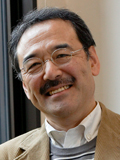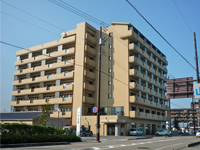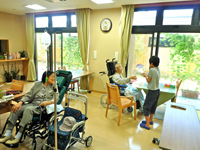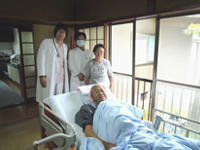Promoting Public Consciousness of Decision-making on Elderly Care<CategoryⅠ>

Project Director : Tetsuro SHIMIZU
(Professor,Graduate School of Humanities and Sociology,The University of Tokyo)
(Length:3years)
Project goals
1) To develop a series of worksheets to facilitate the process through which older adults and their family members make decisions on end-of-life care
2) To identify how older adults can reflect on and reconstruct their view on the ideal way of spending the final days of their lives and the role of medical and formal care
Project overview
We have identified the following factors as preventing elderly people from living as they wish in familiar residential environments until the final stages of life.
1) Lack of readiness to support the decision-making process of individuals and family.
2) Limited understanding regarding the role of medical treatment and living well in the final stages of life.
3) Negative images regarding the introduction of social care in order to reduce the burden of family care.
This project seeks to address the awareness and understanding of ordinary residents and citizens in this way with a view to making improvements. We are working on the following areas of research and development.Comprehensive and successive decision-making process notes for individuals and families
This research group has already commenced development of a (decision-making process notes) tool to assist the individuals concerned and their families in following an appropriate process in reaching decisions regarding the introduction of artificial nutrition (such as gastrostomy) for elderly persons incapable of oral ingestion. Having evaluated the usability and results of this trial in the relevant community and in many medical and nursing-care workplaces, we will develop comprehensive and successive decision-making process worksheets to support processes not only for the problem of artificial nutrition, but also other processes for thinking about significant problems that elderly people have—where they will live, and the sort of care they will receive.
Helpingordinary people to better understand social care, the role of medical treatment, and living well in the final stages of life.
Through personal interviews with residents in and around the relevant communities, this study will investigate the actual state of awareness/opinions regarding points 2 and 3 listed above. Through analysis of the results, we will identify any incorrect awareness or values considered inappropriate which are responsible for points 2 and 3 listed above.
Subsequently, based on these findings, we will encourage the development of ways to amend this incorrect awareness or critically reflect on these values.
This research group is composed of a group from the Death & Life Studies and Practical Ethics at the University of Tokyo as well as the Narrative Home group based in the city of Tonami, Toyama Prefecture (the community where this research takes place). Through the collaboration of researchers and care practitioners, this project can be expected to withstand theoretical criticism, while also achieving successful results for practical use in the field.
Stakeholders
![]() University of Tokyo
University of Tokyo
![]() Narrative Home
Narrative Home
![]() Oume Keiyu Hospital
Oume Keiyu Hospital
![]() National Center for Geriatrics and Gerontology
National Center for Geriatrics and Gerontology
![]() Community Life Support Center
Community Life Support Center
![]() The city of Tonami
The city of Tonami
![]() Specialist group of nursing elder people
Specialist group of nursing elder people
Community spotlight: The town of Tonami (Toyama Prefecture)
Narrative Home, a medical care foundation located on the first floor of the Tulip-no-Sato (Village of Tulips) building close to JR Tonami Station (in the city of Tonami, famous for tulip, in Toyama Prefecture), is home to the Monogatari clinic, an at-home nursing care support center, a home visit nurse station, and a home helper station. It has been providing the surrounding area with comprehensive medical and nursing care since its launch in April 2010. In addition, adjacent to these facilities is the Monogatari-no-Sato (Village of Stories) cluster of rental housing (16 residences, managed by a separate organization), a unique effort offering residential nursing care for residents who find it difficult to receive care at their own homes. Clinic director and foundation chairman Nobuhiko Sato has long been involved in providing medical care focused on the elderly in Tonami. His view is that while seeing patients from a medical perspective is important for health care, more important is the irreplaceable story of each individual’s life. Narrative Home was founded with the intent of assembling a framework for medical care centered on this principle. We would like to advance the development of this research while remaining mindful of how these activities and their effects can encourage public awareness as a community.
 |
 |
 |




